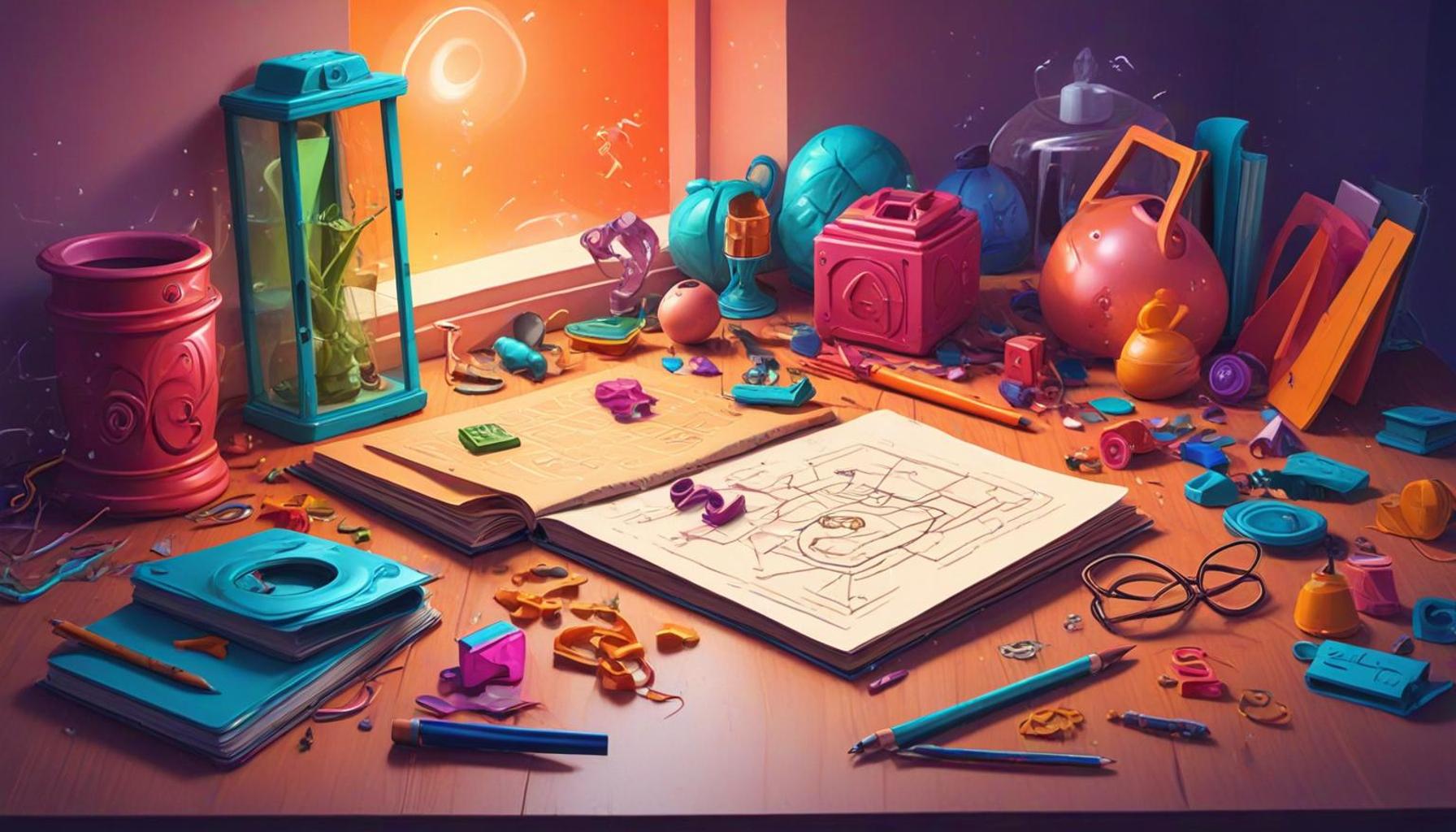Master Brain Teasers Techniques to Train Quick Thinking Skills

The Importance of Quick Thinking in Everyday Life
In contemporary society, where rapid choices are more crucial than ever, the need for quick thinking skills has soared. Whether you are weaving through intricate workplace challenges, participating in dynamic discussions, or even engaging in everyday negotiations, the ability to think on your feet can create a significant edge. An excellent way to cultivate these skills is through brain teasers. These puzzles not only entertain but also stimulate mental processing and enhance cognitive functioning.
Benefits of Engaging with Brain Teasers
Brain teasers are more than mere diversions; they are instrumental in encouraging various critical cognitive skills. Here are several key benefits:
- Critical thinking: These puzzles require analyzing situations from multiple perspectives. For instance, the classic riddle, “What has keys but can’t open locks?” challenges individuals to think abstractly about the concept of keys and their various functions.
- Rapid problem-solving: Brain teasers enhance your capability to arrive at solutions quickly. Consider a scenario where a business manager must make an immediate decision regarding a budget cut; the skills honed from solving quick brain teasers can facilitate faster and more accurate decision-making.
- Creative thinking: Puzzles often inspire unique ideas and innovative solutions. For example, using visual brain teasers can trigger creative approaches in arts or marketing strategies that could benefit localizing brands in Nigeria, such as leveraging cultural symbols or community narratives.
Inclusivity and Enjoyment Through Cultural Elements
These mental exercises aren’t limited to a specific group; they can be enjoyable and beneficial for anyone, regardless of their background. In Nigeria, traditional riddles reflect the rich tapestry of local culture, encompassing various languages and folklore. Engaging with these can provide both entertainment and intellectual enhancement, bridging gaps between generations. For example, riddles passed down from elders can be practiced in social settings, making gatherings vibrant and stimulating.
Scientific Insights on Mental Agility
Research underscores the cognitive advantages of regular brain teaser engagement. Studies have shown that consistent practice can not only enhance mental agility but also contribute to improved overall intelligence, making it evident that this is a worthwhile pursuit. Specifically, cognitive exercises foster a more flexible mindset, which is essential for adapting to the fast-paced demands of modern life.

Embark on Your Journey to Enhanced Quick Thinking
In delving into the intriguing universe of brain teasers and puzzles, you will find that developing these skills is both enjoyable and rewarding. By embracing these challenges, you not only sharpen your quick thinking abilities but also build confidence in confronting everyday adversities. Take the plunge, explore different teasers, and transform your cognitive capabilities while enjoying the creativity and laughter they bring!
SEE ALSO: Click here to read another article
Effective Techniques to Master Brain Teasers
Mastering brain teasers requires not only practice but also the adoption of effective techniques that can make problem-solving more intuitive and less time-consuming. Below are key strategies to elevate your quick thinking skills through engaging with brain teasers:
1. Break Down the Problem
One of the first steps in solving brain teasers is to methodically deconstruct the puzzle. This process involves:
- Identifying the essential components: Look for keywords or phrases that offer clues. For instance, in a riddle, words like “always,” “never,” or “can” may indicate important relationships.
- Eliminating distractions: Focusing solely on the puzzle eliminates noise. In a noisy environment typical of many urban settings in Nigeria, isolate yourself to sharpen concentration.
2. Utilize Visualization Techniques
Many brain teasers, especially those that involve sequences or patterns, benefit significantly from visualization. Drawing or sketching can reveal relationships that might not be obvious when thinking abstractly. Techniques like mind mapping can also be particularly beneficial in organizing thoughts and ideas. For example, sketching out a complex riddle can help clarify relationships between items or concepts, leading to quicker solutions.
3. Embrace Pattern Recognition
As you engage with different puzzles, take note of recurring themes and solutions. Pattern recognition is a crucial part of quick thinking and can be mastered through:
- Regular practice: The more brain teasers you solve, the more familiar you will become with various patterns, enabling rapid thought processing.
- Group discussions: Partake in study groups or community gatherings where participants discuss their thought processes for specific puzzles. This collaborative approach can unveil unique perspectives and strategies that you may not have considered before.
4. Time Yourself
To further hone your quick thinking, incorporate a timed element into your practice. Challenge yourself to solve brain teasers within a set timeframe, gradually decreasing the duration as you improve. This technique introduces a pressure element that mirrors real-life scenarios, where quick decisions are often necessary. For example, set a timer for three minutes while solving specific riddles, adding an exhilarating component while sharpening your reflexes.
5. Use Cultural Context to Enrich Understanding
In Nigeria, riddles and brain teasers often carry cultural significance. Engaging with local proverbs, folklore, and stories can not only enhance your problem-solving perspectives but also instill a deep understanding of the cultural context behind these puzzles. By incorporating familiar elements into your practice, you can create a more relatable and enjoyable learning experience, improving retention as well.
By integrating these techniques into your routine, you will not only become adept at solving brain teasers but will also find yourself applying these quick thinking skills effectively in various real-life situations. This journey toward mastery can turn puzzling challenges into opportunities for mental growth and agility.
| Category | Description |
|---|---|
| Cognitive Development | Engaging in brain teasers enhances problem-solving skills and stimulates memory. |
| Improved Focus | Regular practice promotes greater attention span and reduces mental fatigue. |
| Stress Relief | Solving puzzles offers a fun distraction, helping to reduce daily stress. |
| Enhanced Creativity | Challenging yourself with new tricks and riddles activates creative thinking. |
In exploring the art of quick thinking, a plethora of techniques emerges, with brain teasers standing out as a fun and effective method. These engaging puzzles not only serve as entertainment but also significantly enhance cognitive skills, allowing individuals to think on their feet. The mental gymnastics involved in solving various issues sharpens one’s problem-solving skills, allowing for quicker responses in everyday situations.Additionally, incorporating brain teasers into daily routines fosters improved focus. As individuals tackle challenges, they learn to maintain concentration, which translates into better performance in both personal and professional environments. Moreover, the act of solving puzzles provides a much-needed reprieve from everyday stressors, offering stress relief while simultaneously stimulating the mind.Engaging with these techniques also enhances creativity. As one encounters different types of challenges, novel solutions are often required. This not only broadens one’s thinking patterns but also encourages innovative approaches to problem-solving. In a world that values speed and efficiency, mastering these brain teaser techniques can provide a significant advantage.
SEE ALSO: Click here to read another article
Advanced Strategies for Enhancing Cognitive Flexibility
As you delve deeper into mastering brain teasers, implementing advanced strategies can profoundly impact your quick thinking capabilities. These techniques not only polish your solving skills but also help cultivate a mindset that thrives under pressure. Here are several advanced strategies to further fine-tune your cognitive agility:
6. Engage in Diverse Types of Puzzles
To sharpen your quick thinking skills, diversify the types of brain teasers you tackle. Exposure to various formats such as logic puzzles, Sudoku, lateral thinking challenges, and word problems will enhance your ability to switch contexts swiftly. This cross-training stimulates different parts of the brain, promoting a holistic approach to problem-solving. Additionally, consider exploring traditional Nigerian games like ludu or ayo, as these cultural games also enhance critical thinking while enriching your understanding of local strategy.
7. Adopt the “What If” Approach
Experimenting with the “What If” mindset can foster creativity in problem-solving scenarios. While working through a brain teaser, ask hypothetical questions, such as “What if this element had a different value?” or “What if I approach it from the end result?” This method encourages out-of-the-box thinking and often leads to unique perspectives and solutions. For instance, while solving a riddle that revolves around a traditional tale, think about alternative endings or causes that may lead to different conclusions.
8. Reflect on Your Thought Process
After solving a brain teaser, take a moment to reflect on your thought process. Analyze how you approached the problem, what strategies worked well, and where you might improve. By developing a habit of self-reflection, you not only reinforce your learning but also cultivate a deeper understanding of your cognitive patterns. Documenting this process in a journal can be particularly beneficial; it allows you to look back on your progress over time and identify trends in your thinking.
9. Simulate High-Pressure Environments
Quick thinking is often required in high-pressure situations, so practice simulating these conditions during your training sessions. Create a controlled environment with distractions or set strict time limits to replicate the urgency that accompanies real-life decision-making. Utilize online platforms or mobile apps that feature brain teasers with a competitive edge, creating scenarios where you can challenge friends or family members. This competitive spirit not only enhances your quick thinking skills but also makes the learning process enjoyable and more engaging.
10. Incorporate Mindfulness Practices
Surprisingly, mindfulness can be a powerful ally in enhancing quick thinking. Regular mindfulness exercises, such as meditation or focused breathing, can improve concentration, reduce anxiety, and help with clearer decision-making. Especially in high-stress environments typical in bustling cities like Lagos, maintaining a calm mindset can lead to sharper cognitive responses. By fostering mental clarity, mindfulness allows you to approach brain teasers with renewed focus, making it easier to dissect problems accurately.
By adopting these advanced strategies, you create a robust framework for sharpening your quick thinking skills through brain teasers. With ongoing practice, you will find yourself equipped to tackle a broad spectrum of cognitive challenges, ultimately boosting your confidence both in games and day-to-day decision-making scenarios. The journey of mastering brain teasers not only enriches your cognitive toolbox but also contributes significantly to personal and professional growth.
CHECK OUT: Click here to explore more
Conclusion: Unleashing Your Cognitive Potential
In a rapidly evolving world, the ability to think on your feet has never been more valuable. By mastering brain teasers techniques, you not only enhance your quick thinking skills but also equip yourself to face daily challenges with increased agility and confidence. The advanced strategies outlined in this article encourage a multifaceted approach to cognitive development. By engaging with diverse puzzles, adopting a creative “What If” mindset, and implementing mindfulness practices, you create a robust foundation for mental resilience.
Moreover, reflecting on your problem-solving processes helps solidify your learning, while simulating high-pressure scenarios prepares you for real-world decision-making. In Nigeria, where the rhythm of daily life can be frenetic, honing these skills is essential—not just for personal growth but also for professional excellence. Engaging in local games like ludu or ayo connects you with cultural roots while enhancing your strategic thinking, making the journey both enriching and enjoyable.
Ultimately, the quest to master brain teasers is more than a pastime; it’s a valuable investment in your intellectual toolkit. Embark on this journey today, and unlock the potential that lies within. As you sharpen your quick thinking capabilities, you will not only tackle brain teasers with ease but also navigate life’s challenges with newfound clarity and confidence. Consider exploring additional resources, joining local puzzle-solving groups, or seeking out online platforms to further cultivate your skills—your mind will thank you.


